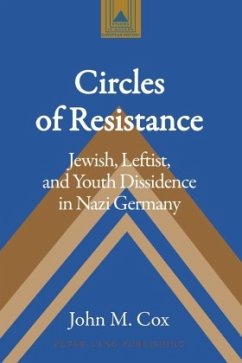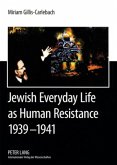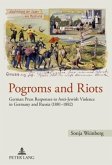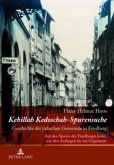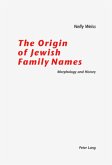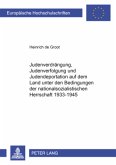Circles of Resistance: Jewish, Leftist, and Youth Dissidence in Nazi Germany analyzes resistance networks of young German Jews and other young dissidents during the Nazi dictatorship. Young German-Jewish radicals created an intellectually and politically vibrant subculture in Berlin, the geographical focus of this study. The youths analyzed here were reacting not only to Nazi oppression: they were also driven to develop new modes of action and politics by their estrangement not only from German society, but also from the traditional left parties and their post-1933 underground organizations, and even from large segments of Berlin's Jewish community, where radical activism was often regarded as counter-productive and needlessly provocative. At the center of this study are the Herbert Baum groups, led by members of Germany's Communist Party (KPD). While the Baum groups were the largest, they were but one of several resistance operations that were situated partially within the milieu created by Communists, Socialists, Trotskyists, and radical Jewish youths. Based on archival research in Germany, Paris, Amsterdam, and Jerusalem, and interviews with veterans of the anti-Nazi resistance, Circles of Resistance analyzes the overlap of these diverse social and political dimensions among dissident circles and offers a reconsideration of traditional thinking on leftist and Jewish resistance and youth subcultures of the Third Reich. Circles of Resistance will be useful for undergraduate as well as graduate courses on Jewish history, Nazi Germany, and the Holocaust, as well as courses devoted to the history of European socialism.
«This well-written, thoroughly researched study of Jewish resistance in Germany during the Holocaust opens new vistas on this important subject and provides new insight into the whole question of Holocaust memory in post-World War II East Germany. It is essential reading for anyone interested in Jewish resistance and Holocaust memory.» (David M. Crowe, Professor of History and Law, Elon University, North Carolina; Author of, Among Other Works, 'Oskar Schindler: The Untold Account of His Life, Wartime Activities, and the True Story Behind the List' and 'The Holocaust: Roots, History, and Aftermath')
«John M. Cox manages to rescue for history a long-obscured dimension of resistance in wartime Berlin - that of left-wing Jewish youth to a regime determined to destroy them. Using archived police interrogation records, a few memoirs of participants, and interviews with others, Cox reconstructs the milieu in which Jewish leftists managed to function in wartime Berlin. He concludes with a chapter of reflections on how Cold War exigencies produced strikingly contradictory memories of this resistance in East and West Germany.» (Karl A. Schleunes, Professor of Modern German and Holocaust History, University of North Carolina at Greensboro; Author of, Among Other Works, 'The Twisted Road to Auschwitz: Nazi Policy Toward German Jews, 1933-1939')
«John M. Cox manages to rescue for history a long-obscured dimension of resistance in wartime Berlin - that of left-wing Jewish youth to a regime determined to destroy them. Using archived police interrogation records, a few memoirs of participants, and interviews with others, Cox reconstructs the milieu in which Jewish leftists managed to function in wartime Berlin. He concludes with a chapter of reflections on how Cold War exigencies produced strikingly contradictory memories of this resistance in East and West Germany.» (Karl A. Schleunes, Professor of Modern German and Holocaust History, University of North Carolina at Greensboro; Author of, Among Other Works, 'The Twisted Road to Auschwitz: Nazi Policy Toward German Jews, 1933-1939')

